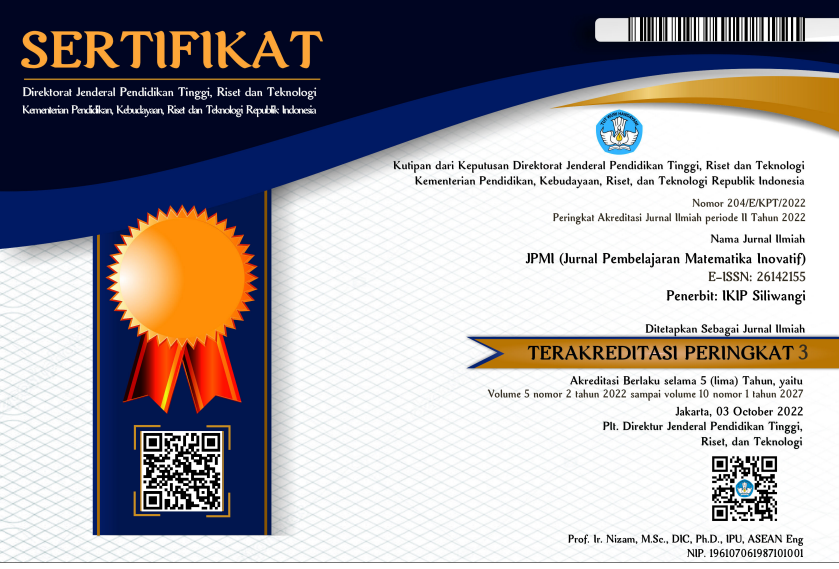KEMAMPUAN BERPIKIR KREATIF MATEMATIK SISWA MTs DITINJAU DARI KEMAMPUAN RESILIENSI MATEMATIK SISWA
DOI:
https://doi.org/10.22460/jpmi.v1i2.p171-184Keywords:
Ability of Mathematical Creative Thinking, Ability of Mathematical ResilienceAbstract
This research aims to know where is the mistake of students on the tests of the ability of mathematical creative thinking in terms of the ability of mathematical resilience. The subject taken in this research that is grade VIII-A of MTs Fatahillah Cimahi consists of 26 students. This research used descriptive methods with qualitative and quantitative data analysis. Stages of the research done with 4 stages: filling the quisioner mathematical resilience, mathematical creative thinking ability test, data analysis and concluded. The results of this research were obtained: 1) students with high level of ability of mathematical resilience made a mistake at the indicator of original thinking skills (originality) and fluent thinking skills (fluency), 2) students with medium level of ability of mathematical resilience made a mistake at the indicator of detailed thinking skills (elaboration), 3) students with low level of ability of mathematical resilience made a mistake at the indicator of original thinking skills (originality), fluent thinking skills (fluency) and detailed thinking skills (elaboration).
References
Dilla, S. C., Hidayat, W., & Rohaeti, E. E. (2018). Faktor Gender dan Resiliensi dalam Pencapaian Kemampuan Berpikir Kreatif Matematis Siswa SMA. Journal of Medives, 2(1), 129-136.
Fatimah. (2011). Faktor Penentu Obyektivitas dan Kreativitas. In Majalah Ilmiah, Edisi Maret-April 2011. Sekretariat LPPM UNINDRA.
Hendriana, H., Rohaeti, E. E., & Hidayat, W. (2016). Metaphorical Thinking Learning and Junior High School Teachers' Mathematical Questioning Ability. Indonesian Mathematical Society Journal on Mathematics Education, 8(1), 55-64.
Hidayat, W., & Sariningsih, R. (2018). Kemampuan Pemecahan Masalah Matematis dan Adversity Quotient Siswa SMP Melalui Pembelajaran Open Ended. JNPM (Jurnal Nasional Pendidikan Matematika), 2(1), 109-118.
Johnston-Wilder, S. & Lee, C. (2010). Mathematical Resilience. In Matematics Teaching (pp. 38–41).
Kooken, J. dkk. (2013). Measuring Mathematical Resilience: an application of the construct of resilience to the study of mathematics. In American Educational Research Association (AERA) 2013 Annual Meeting: Education and Poverty: Theory, Research, Policy and Praxis, 27 April - 1 May 2013. San Francisco, CA, USA.
Munandar, U. (1999). Mengembangkan Bakat dan Kreativitas Anak Sekolah. Penuntun Bagi Guru dan Orang Tua. Jakarta: Grasindo.
Munandar, U. (2009). Pengembangan Kreatifitas Anak Berbakat. Jakarta: Rineka Cipta.
Nawawi, H. (2012). Metode Penelitian Bidang Sosial. Yogyakarta: Gadjah Mada University Press.
Nurjaman, A. & Sari, I. P. (2016). Penerapan Pembelajaran Berbasis Masalah Untuk Meningkatkan Resiliensi dan Pemahaman Matematik Siswa SMA. Prosiding Seminar Nasional Matematika Dan Pendidikan Matematika STKIP Siliwangi, 4, 43–49.
Poerwadarminta, W. J. S. (2006). Kamus Umum Bahasa Indonesia. Jakarta: Balai Pustaka.
Purwanti, E., & Darminto, B. P. (2012). Penerapan Model Pembelajaran Brainstorming untuk Meningkatkan Kemampuan Berpikir Kreatif Siswa Kelas VII E. Jurnal Program Studi Pendidikan Matematika Universitas Muhammadiyah Purworejo, 30–35.
Shahidayanti, T. (2012). Pengembangan Modul Pada Materi Segi Empat Untuk Siswa Kelas VII SMP Berdasarkan Pendekatan Kontekstual Untuk Meningkatkan Hasil Belajar Siswa. In Modul Matematika Segi Empat dengan Pendekatan Kontekstual (pp. 1–107).
Siswono, T. Y. E. (2004). Merancang Tugas Untuk Mendorong Berpikir Kreatif Siswa Dalam Belajar Matematika. In Konferensi Himpunan Matematika Indonesia, Bali : 23-27 Juli 2004.
Sumarmo, U. (2016). Resiliansi Matematik (Mathematical Resilience). Prosiding Seminar Nasional Matematika Dan Pendidikan Matematika STKIP Siliwangi, 4, 23–41.

















